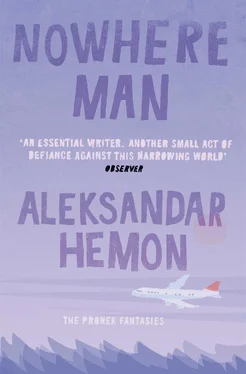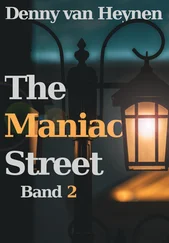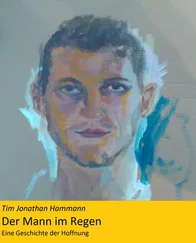In November, he got a call from the American Cultural Center and the director’s secretary said (the director had left, because Sarajevo was becoming unsafe) they were inviting him to visit the USA and learn more about it, as he was a young journalist likely to promote the values of freedom. “When can I go?” Pronek asked immediately, though he was not sure what his relation to freedom was.
So, here we are at the Sarajevo airport, January 1992. Pronek’s father drops him off without entering the airport, because there is no parking. Pronek watches the jalopy car pulling away, his father slouching over the steering wheel as if shot in the back. He can see his hairy neck and his eyes in the rearview mirror, tired and old. Pronek feels abrupt sorrow, dragging his suitcase with its blocked hind wheels leaving two trails behind, like the heels of a corpse. He waits for his plane in the airport restaurant, sipping vinegary coffee. He watches a family cluster: bags, suitcases, children, surrounded by men smoking and women wiping their eyes.
Then he is on his plane, buckling up, looking warily at the mountains encircling the airport. The seat next to him is empty. The plane goes up, his stomach goes down, and he is careful not to show that he is afraid to die. He looks down and can see a line of dots trickling out of the airport building toward another plane.
One of those dots is my head, with a hairless medallion in its center, following Pronek like a shadow, moving toward my plane and my destiny. I look up and see the plane disappearing into the clouds. Pronek takes the last look at the city sprawling in the valley, as if kissing a dead person, the fog creeping along between buildings. He is oblivous to me, as a wall is oblivious to a shadow dancing on it.
The plane penetrates the clouds and Pronek can see nothing. By the time the plane exits the dark wool of clouds and enters the bright starless sky, he already cannot remember what happened yesterday. The sun is blazing through the window, so Pronek pulls down the shade.

KIEV, AUGUST 1991
Meantime we Will expressour darker purposes. Chicago, London, Amsterdam, Vienna, Warsaw, whence I took a cheap train to Ukraine. I boarded my train, found the couchette waiting for me, enveloped in thick veils of smoke and an obscure cologne called Antarctica: I watched the man in the bed across splashing a few palmfuls out of a gelid-blue bottle before the train left the station. He unbuttoned his shirt, as if stripping for me, slowly divulging his sooty tapestry only to stop an inch above his navel. The discomfort I felt then I am inclined to see now as a sense of momentousness — doubtless a rearview interpretation. The man lit a cigarette, eagerly opened a booklet with a chesty damsel in sexy distress on the cover, with a title that I — the uncertain, occasional speaker of an obsolescent Ukrainian dialect — decoded as The King of Midnight.
The King of Midnight offered me a sip now and then from a smudgy bottle. Having quickly slurped his way to the bottom, he threw himself on his bed with such force that an earthquake suddenly took place in my dream: the earth cracked open, swallowing swarms of citizens; roads whiplashed, throwing cars around like matchboxes; buildings collapsed flat. As the train crawled through Poland, I crept through a series of nightmares — all sequels to the earthquake one and involving a WalMart and the Sears Tower, plus mice, midgets, brooms, and other Freudian gewgaws. The final one was staged on the Soviet border: a mob of shabbily uniformed men with humongous flat hats waited in a shower of sallow, gnat-infested light; they stepped into the shadows and then onto the train. They alternately looked into the King of Midnight’s passport and into his woozy face, as if comparing them until they matched. They flipped through my American passport, determinedly not impressed with the plentiful freedoms it implied, let alone the rich collection of visas collected on my existentialist peregrinations. They still let me in, albeit with a humbling frown, conveying that they could stop me, indeed vanish me, had they only wished to. But they wished other, more profitable things, so they practically threw my passport at me. I went to have breakfast in the dining car.
The dining car is a generous description of a few tables adorned with tablecloths that looked like a canvas of the local Jackson Pollockovich. A painfully bored attendant was reading the papers, his body telling— begging —the tired traveler to go away and never come back. Two men were sitting at one of the tables, their foreheads occasionally touching above the full ashtray in the table’s geographic center. They argued over something, downing a glass of vodka (which, for a moment or two, I hoped was water) between florid bursts of rhetorical affection. From what I could understand, the focal point of their argument was one Evgenij, whose distinguishing feature was that he was simultaneously a filthy bastard and the kindest man alive. You could never know with Evgenij, who would stick a knife between your eyes, but who would also give you the undershirt off his back if you asked him: they agreed and kissed and downed a glass of vodka, and then another one. It struck me then — and I still have an ocean-shaped bruise where it struck me — that there was no reason whatever to talk about me, that I was extraneous to almost all of the conversation taking place in this world at any given time. And I envied Evgenij, the kindest living son of a bitch.
I went back into the couchette. I fell asleep again and woke up only after the train entered Kiev with a poignant decrescendo. The King of Midnight sat up with a grunt, clawed at his chest for a minute, then hawked and mindfully spat into one of the empty bottles.
Humid evening heat; the streets covered with a dark, oily placenta. A man named Igor was waiting for me, holding a sign with my name on it. He was blond, blue-eyed, sinewy as a marathon runner, cautiously clever — painted with many colors, as they say. I present that as a fact, while it was barely a somnolent impression at the time. I got off the train, stepping on top of a steam cloud (though the train was not a steam train — what we have here is a remake of Karenina getting off the train to be welcomed by Karenin and his banal big ears), walking slowly toward the station building as the arriving women kissed the waiting men. I got into Igor’s car, which reeked of vomit and pine. A man named Vladek silently sat in the back seat, inhabiting a magnanimous smile. We glided through the streets of Kiev, entering light from darkness, darkness from light. I could not speak, as I was tired and dazed. I managed to understand whatever Igor was saying in his guttural Ukrainian, but what he was saying I do not remember. I do remember occasionally looking back at Vladek, to check if he still existed, and he grinning with the demented enthusiasm of full-fledged existence, flexing his eyebrows and winking at me, as if we had already become fellow conspirators in an obscure plot.
Everything in the building was exceptionally orderly, hall carpets stretching straight, walls white like Christmas snow. Igor told me that the place was a Party school, normally, but that they were permitted to use it for the summer.
He opened the door of a room, I walked in reluctantly Vladek dropped my suitcases, and winked the final wink. My roommate-to-be was frisking a pillow, bare-chested, wearing only shorts with an anchor pattern. “I am Jozef,” he said, and offered his hand, still warm from patting the pillow. “Jozef Pronek.” Allow me to introduce myself: I am Victor Plavchuk. Nominally I came here for the sake of connecting with my roots, but really was looking for something to do until I figured out what to do. Now allow me to invoke Jozef’s slouched shoulders, his square chin, and his eyes: almond, dark, and a mile deep. This is how I remember it now — the excitement is ex post facto — but it was much different then: thus is his cheek a map of days outworn. We stared at each other for an embarrassed moment, waiting for Igor to say something and pull us out of the mud of silence. Then there is a confusing blank: what we did or said after Igor left, I do not remember.
Читать дальше













